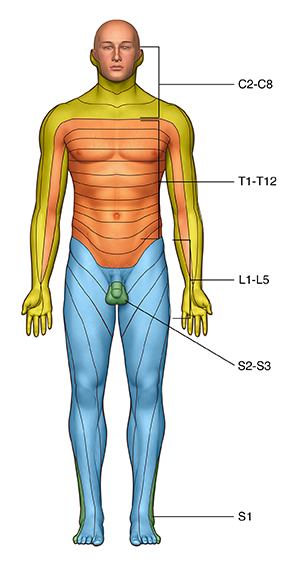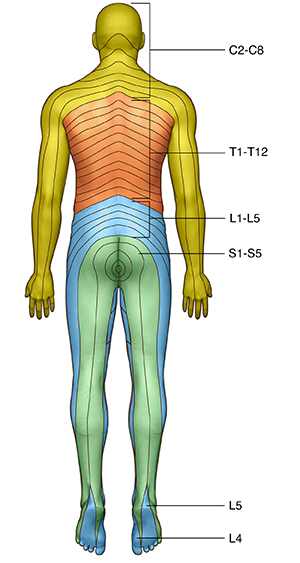A
B
C
D
E
F
G
H
I
J
K
L
M
N
O
P
Q
R
S
T
U
V
W
X
Y
Z
Topic IndexLibrary Index
Click a letter to see a list of conditions beginning with that letter.
Click 'Topic Index' to return to the index for the current topic.
Click 'Library Index' to return to the listing of all topics.
Dermatomes
What is a dermatome?
Your nervous system is made up of your nerves, spinal cord, and brain.
Nerve information such as pain, heat, or cold travels from your hands, arms, legs, feet, trunk, or head to your spinal cord and then to your brain. When healthcare providers are trying to diagnose a nerve problem, they find it useful to think of what nerve or part of the spinal cord may be involved in the problem. If your leg doesn't work as it should, for instance, your provider may look at the nerve or nerves that send nerve information from your leg. Or the provider might decide your leg problem is linked to a certain part of your spinal cord. When that's the case, the area affected may involve a dermatome. This is a spinal nerve linked to that area of your leg.
What is a dermatome map?
The illustration below is called a dermatome map. It shows a series of lines that run from the spine around the trunk or out along the arms or legs. The areas between the lines are dermatomes. These are areas where nerves in various parts of the body connect to the spinal cord. The actual location of the lines varies from person to person. Skin on your face has dermatomes that correspond to nerves connecting directly to the brain.
If your provider thinks you might have a problem in your spine, they may look for dermatome patterns of loss of function, especially loss of sensation. If your provider thinks you might have a problem in one or more nerves after they leave the spine, then they may look for a pattern of problems that correspond to where that nerve goes and what it does: Is it involved in sensation? Or does it govern how your muscles work?


Online Medical Reviewer:
Anne Fetterman RN BSN
Online Medical Reviewer:
Joseph Campellone MD
Online Medical Reviewer:
Raymond Kent Turley BSN MSN RN
Date Last Reviewed:
9/1/2022
© 2000-2025 The StayWell Company, LLC. All rights reserved. This information is not intended as a substitute for professional medical care. Always follow your healthcare professional's instructions.